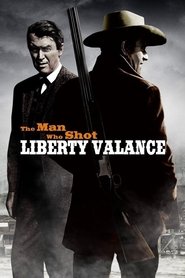Although the title of John Ford’s elegiac Western The Man Who Shot Liberty Valance refers to a single person, in reality it takes a matched set of heroes to defeat the eponymous outlaw. If the Western genre is fundamentally about the relationship between the individual and society—advancing the thesis that America’s history and rituals were forged by alpha males on either side of the law—then Ford’s masterpiece examines those dynamics with wary detachment rather than blind idealism.[…]
In a year when Kennedy was tasked with an impossible balancing act—between being willing to go to war and staving off the possible apocalypse with diplomatic finesse—the mournful dichotomy of The Man Who Shot Liberty Valance had extra metaphorical heft, gesturing toward certain enduring American virtues while hinting at their malleability as the country moved further away from its roots.
— Adam Nayman (The Ringer)
The Western is intrinsically the most political movie genre, because, like Plato’s Republic, it is concerned with the founding of cities, and because it depicts the various abstract functions of government as direct, physical actions. It’s also an inherently romantic genre, because of its connection with the nation’s founding mythology. […] The movie’s most famous line, of course, is that of a newspaperman: “This is the West, sir. When the legend becomes fact, print the legend.” Ford prints it—and prints the facts behind it—and makes a movie about the moral burden of a life lived in the name of a myth and the ethical implications of direct action. Implicitly, the subject of the film is also that of a nation founded in this way.
— Richard Brody (The New Yorker)
Synopsis: Questions arise when Senator Stoddard attends the funeral of a local man named Tom Doniphon in a small Western town. Flashing back, we learn Doniphon saved Stoddard, then a lawyer, when he was roughed up by a crew of outlaws terrorizing the town, led by Liberty Valance. As the territory's safety hung in the balance, Doniphon and Stoddard, two of the only people standing up to him, proved to be very important, but different, foes to Valance.

